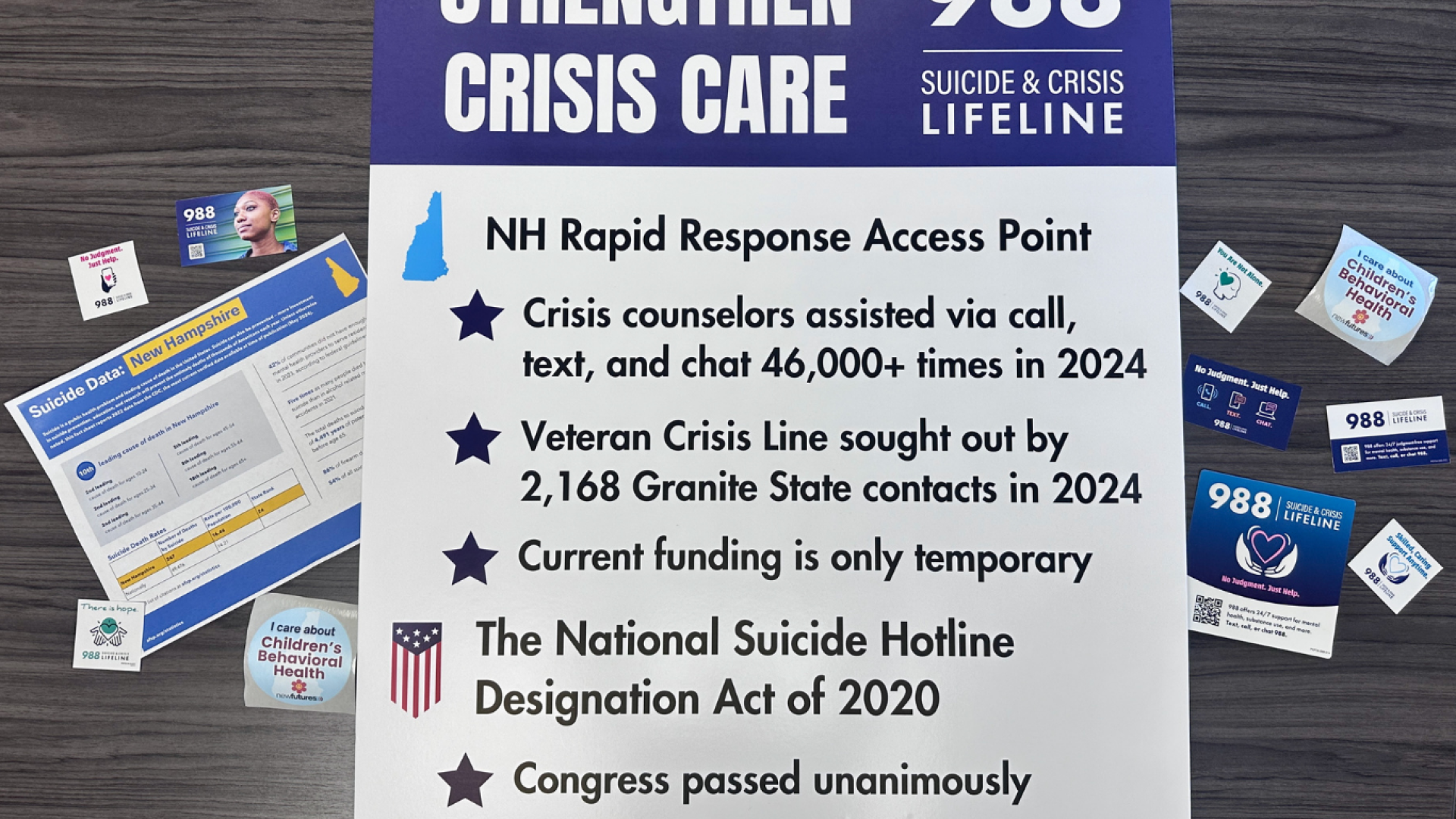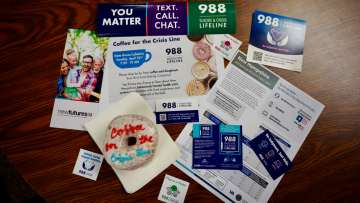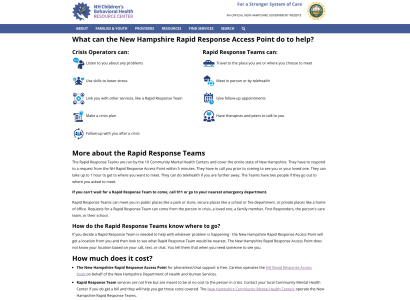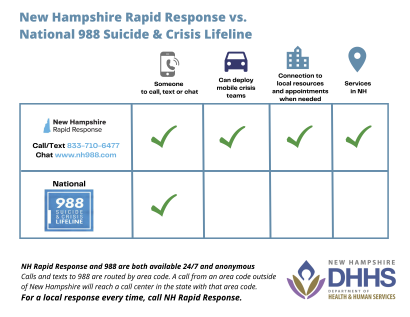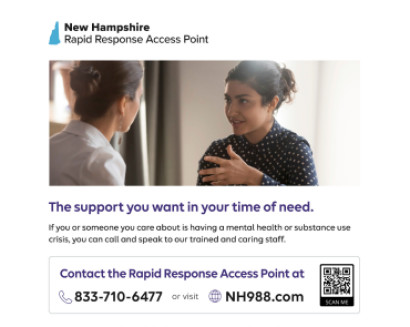
New Hampshire's Behavioral Health Crisis Care System serves both children and adults experiencing crises related to suicide, mental health, and substance abuse.
It follows 2025 national guidelines and findings from the New Hampshire Commission on Behavioral Health Crisis Services with its three pillars:
Someone To Contact
In 2020, the U.S. Congress unanimously passed, and President Trump signed, the National Suicide Designation Act, establishing 988 as the nationwide, universal number for suicide, mental health, and substance use crises.
In the Granite State, the NH Rapid Response Access Point is free and available 24 hours a day, 7 days a week, 365 days a year by call, text mesages, or online chat. It is intended for anyone feeling hopeless or overwhelmed. Depending on needs, caring and trained crisis operators may assist by:
• Listening, providing support, and problem solving.
• Sending a mobile crisis team to a home, workplace, or another location.
• Finding local resources like a same-day/next-day appointment at a community mental health center.
• Connecting someone in severe distress to a crisis stabilization center.
Calls and text messages to 988 are routed by area code. Those seeking help from a phone with a 603 area code will automatically reach the NH Rapid Response Access Point. If using a phone with an out-of-state area code, use 833-710-6477 for a local response.
Someone To Respond
Mobile Crisis Response Teams run by each of New Hampshire's ten Community Mental Health Centers became available in 2022.
Skilled crisis clinicians respond anywhere in the state within one hour when dispatched by the NH Rapid Response Access Point. Teams of two are able to provide rapid, on-site assessment at homes, workplaces, or in the community. These MCRTs teams provide supportive interventions, de-escalate or resolve crises, and connect individuals to the appropriate care, like mental health or substance use treatment.
A Safe Place For Help
New Hampshire is home to two Crisis Stabilization Centers, which are designed to serve individuals in severe distress with up to 23 hours of supervised care. These centers provide immediate treatment and support, helping to de-escalate the behavioral health crisis.
Crisis centers are able to provide specialized care in a setting designed for healing, unlike local hospital emergency departments. Crisis centers aim to Granite Staters avoid
inappropriate care and expensive hospitalizations and reduce the burdens on our local hospitals so they can focus on medical emergencies.
These two centers are located in Derry at the Center for Life
Management and in Plymouth at the Lakes Region Mental Health Center.
Why It Matters
To ensure New Hampshire children and adults experiencing suicide, mental health, or substance use crises receive timely, appropriate, and effective support, state policy must continue to sustain and advance the three crisis care pillars.
The behavioral health crisis care system also aims to reduce burdens on local hospital emergency departments, law enforcement, and first responders.1 Its proven interventions are cost-effective for health plans, the state, and municipalities.2
By the Numbers
10
Mobile crisis teams are located throughout New Hampshire and can respond to a crisis within an hour.
46,000
Number of times Granite Staters contacted the NH Rapid Response Access Point via phone, text message, or online chat in 2024.3
26
Children and youth under age 18 were lost to suicide in New Hampshire in the last five years (2020-2024).4
988
Number to call or text message to be connected to the NH Rapid Response Access Point. Note: Calls are routed by your phone's area code. Use 833-710-6477 for a local response every time.
Our Impact
New Futures championed the 2023 legislation to form the Commission on Behavioral Health Crisis Services.
We continue to explore solutions to help New Hampshire better address behavioral health services, including bills to implement a sustainable funding solution for the "Someone To Contact" pillar in 2025 and 2026 bills.
References
1. Crisis Services: Effectiveness, Cost Effectiveness, and Funding Strategies, HHS Publication No. (SMA)-14-4848. Rockville, MD: United States Substance Abuse and Mental Health Services Administration, 2014. https://library.samhsa.gov/sites/default/files/sma14-4848.pdf
2. National Guidelines for Behavioral Health Crisis Care: Best Practice Toolkit. United States Substance Abuse and Mental Health Services Administration, 2020. https://bja.ojp.gov/sites/g/files/xyckuh186/files/media/document/samsha-national-guidelines.pdf
Page 42-43:The table on page 44 shows the very real cost savings that can be realized by implementing mobile crisis and facility-based crisis services in your community... When mobile team and facility-based crisis services are included in optimal ratios...total cost drops by 52% in these projections despite engaging all of these individuals. This means that 32% more individuals are served with programs that align better to the unique level of clinical need while costs are reduced by 52%.
3. "988 data." Email from Division for Behavioral Health: New Hampshire Department of Health and Human Services. March 3, 2025.
4. United States Department of Health and Human Services, Centers for Disease Control and Prevention, National Center for Health Statistics, Provisional Multiple Cause of Death by Single Race 2018 - present, on CDC WONDER Online Database. Provisional data for 2024. https://wonder.cdc.gov/mcd-icd10-provisional.html. November 10, 2025.

